Stress-Relief Tips for Health Care Workers
Apr 23, 2020 | Jonathan Maisel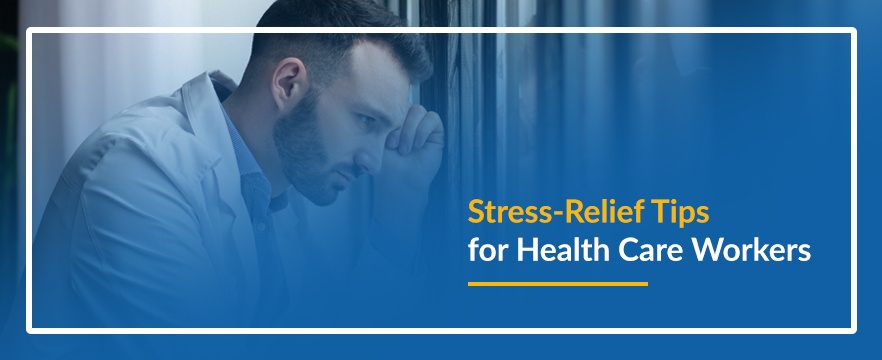
Health care providers are undeniably an asset to the world, but the responsibility of caring for everyone’s well-being comes with a price. That price tends to be extreme stress, which can have a myriad of effects on both the provider and their patients. Stress in health care providers is not a rarity: Health care has the most stress of any other profession, and while a little bit of pressure can be good motivation, too much can be harmful.
Recognizing the stress and finding ways to alleviate it is crucial for anyone, but especially for health care providers, who need to do their jobs properly.
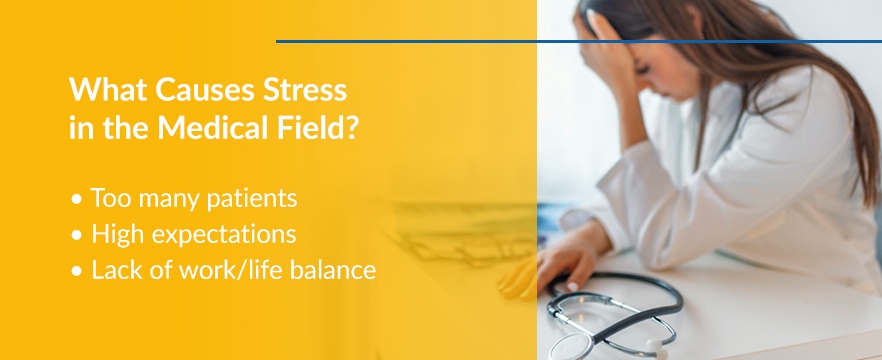
What Causes Stress in the Medical Field?
The health care industry requires its providers to look after the well-being of millions of people and provide exceptional care as well as compassion. But there are some parts of the job that overwhelm workers. Some of the top causes of stress in health care providers are:
- Too many patients
- High expectations
- Lack of work/life balance
Stress management for health care providers is a necessary, but often overlooked, part of providing excellent care.
1. Too Many Patients
Health care providers sometimes end up having far more responsibilities than they should. In a world that is becoming more and more technology-driven, employers increasingly expect their providers to be more productive and deliver better results. If a health care provider has more patients than they can reasonably handle, the pressure to help them all can become overwhelming and lead to workplace stress. There is a limit to how much a single human being can do. Overwork, regardless of how much technology you have on your side, can lead to exhaustion and burnout.
An increase in patient load can result in health care workers becoming overextended, which can see their work suffer and potentially deprive patients of proper care. The chances of this happening increase for those who work in emergency rooms, since the high pressure and the potential of regularly seeing patients die can have an intense psychological effect.
2. High Expectations
It’s not surprising that people have high expectations for health care workers. From patients who rely on them to heal them to their supervisors who may put additional demands on them, health care workers have the burden of healing everyone in record time.
In addition to outside expectations, they may also have set too-high expectations for themselves. Attempting to please everyone at once in a high-pressure industry is a recipe for exhaustion.
Supervisors who hover and micro-manage can add to a worker’s stress because they can make workers feel like someone is monitoring their every move, not trusting them to do their job well. High expectations, coupled with a lack of respect and trust, can negatively affect people’s self-confidence.
3. Lack of Work/Life Balance
With the heavy patient load and higher expectations, it shouldn’t be a surprise that health care workers end up spending more time working than they do with friends and family.
If you’re overly stressed out at work, then go home and take that frustration out on your spouse, you’ll likely find unhappiness on all sides. Additionally, if you work so much that your loved ones feel neglected, that will likely cause rifts in your relationships, which will only add to your existing stress.
People often ignore the need to maintain a clear separation between work and personal life in favor of being a better employee, but the twist is that workers cannot perform well on the job if they don’t take time away from it, too.
Negative Impacts of Stress
Stress isn’t something we can afford to overlook. Our bodies alert us of the stress we’re feeling as a way to remind us to slow down and rest. Unfortunately, many people believe these symptoms are part of being a working adult and don’t think they’re worth looking into. But stress in health care workers puts both the worker and their patients at risk.
It’s essential to recognize the symptoms of stress to better manage it.
1. Physical Symptoms
Stress can manifest itself in several physical symptoms, which include:
- Fatigue
- Headaches
- Muscle soreness or stiffness
- Upset stomach, including constipation or diarrhea
- Sleep troubles, such as insomnia
- Heart trouble, such as palpitations
- Changes in your skin, such as sudden acne
Often, people mistakenly think warning signs like these are typical side effects of working a high-stress job, but they are signals from your body that something is not right.
All these symptoms also hinder the quality of work. If you’re excessively tired because you couldn’t sleep all night and you have aches in your body you can’t account for, you’re likely not going to be as alert as you would be after a proper night’s rest and feeling well. These physical symptoms may also result in health care workers taking more sick days or not performing as well as they used to, because they physically cannot anymore.
Physical symptoms are the easiest way to recognize that you might need to slow down and take steps to reduce stress.
2. Psychological Symptoms
Often less obvious are the psychological symptoms of stress, some of which are:
- Depression
- Anxiety
- Trouble concentrating
- Irritability
- Discouragement
- Pessimism
3. Emotional Burnout
Many of these psychological symptoms are also symptoms of emotional burnout — something about half of all physicians and a third of nurses experience. Along with the irritability and discouragement, health care workers who experience emotional burnout find themselves unable to muster the level of compassion toward their patients that is essential in health care.
Workers may feel exhausted by the idea of going to work in the morning and find themselves looking at patients like objects, rather than human beings in need of help. They may also find they are short-tempered and their well of patience dries up much faster than it used to.
Emotional burnout within the health care industry has shown to decrease patient satisfaction, which is unsurprising, since burned-out health care workers can’t provide the level of care required of them. Weary workers may find themselves not caring for their patients or taking on the stress of their patients’ ailments. The burnout may also end up leading to workers taking more sick days or being difficult to work with while also underperforming their tasks.
Related to emotional burnout is compassion fatigue, in which health care workers feel they’re becoming more callous and insensitive toward patients because they’ve reached their limit.
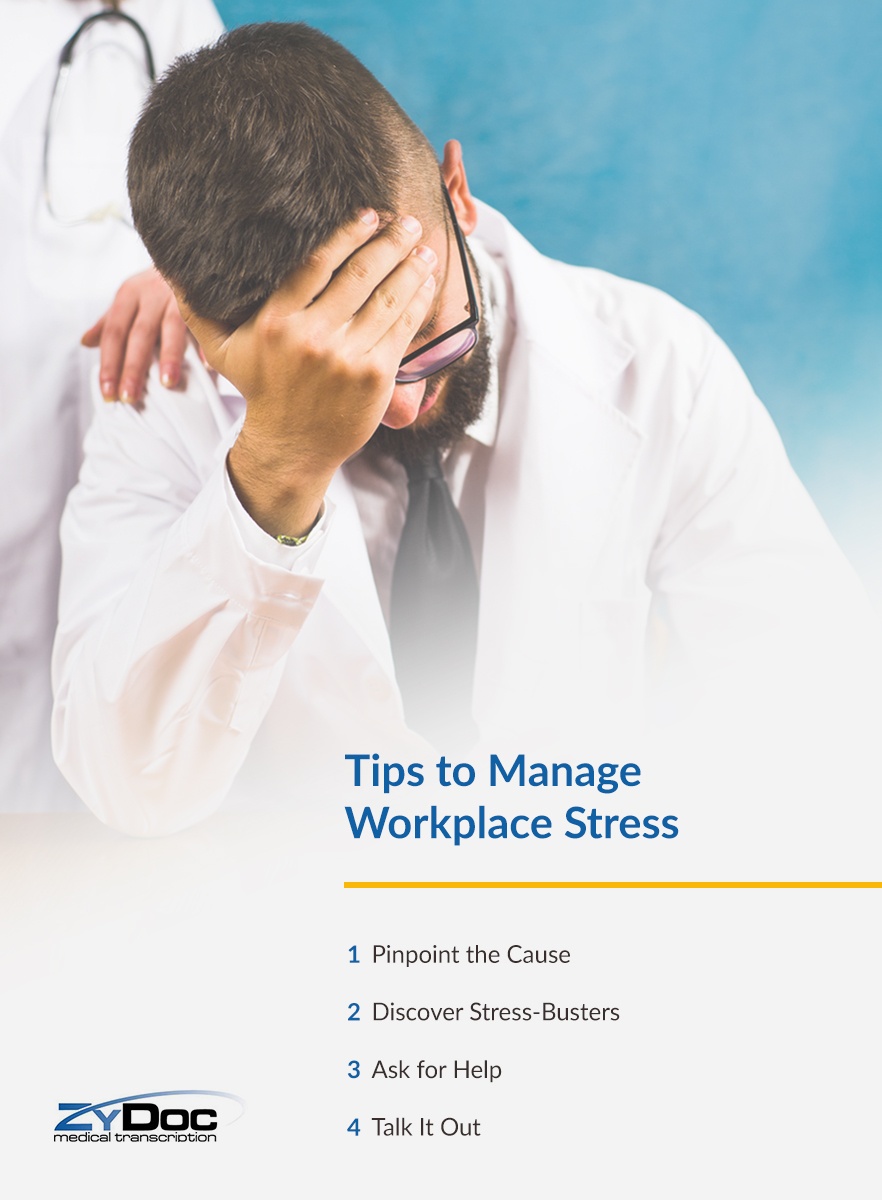
Tips to Manage Workplace Stress
Stress management tips for health care workers usually aren’t much different than those for other industries, but since stress in the medical field is so widespread, it’s even more essential that workers know the signs of stress and solutions for managing it well. Many stress-relief tips for health care workers lean toward activities that help focus on breathing, like yoga or meditation, but they may not be for everyone.
Depending on the specific job and its responsibilities, stress management for health care workers can vary, and it might require trying different things to see what works best for each individual. However, some common ways to manage stress work more often than not.
1. Pinpoint the Cause
If you’re a health care worker who is experiencing workplace stress, your job is the most readily apparent cause of your stress. But there likely is something specific in your workplace that is adding to your burden, and identifying it is the first step to finding a solution. Once you know what is causing your stress, you can begin to think about the changes to make in your work life to lessen the pressure.
For example, if you find you’re overwhelmed because you have a heavy patient load, speak to a supervisor and explain that you’re unable to give each patient the attention they deserve. If you get stressed out about the idea of taking accurate notes about your patients, consider switching to electronic health records (EHRs) instead.
2. Discover Stress-Busters
Each health care professional’s stress management routine differs, and finding what works best for you can take some trial and error. If more conventional activities, like exercise or meditation, work for you, keep it up. But if you’ve tried those and found they haven’t worked for you, there are other ways to incorporate stress relief into your day.
- Singing or dancing: Singing and dancing are both fun ways to let off some steam and be a little silly. Dancing is also excellent exercise — even if you only do moves in private a couple times a day.
- Music: Music is ideal for lifting moods and can also remind us of good memories. Overall, listening to music — particularly Celtic or stringed Indian music — can significantly reduce stress.
- Self-expression: Expressing emotion is a way to get things off your chest, but you don’t have to visit a therapist to do it. Expressions of emotions like laughter or tears can be cathartic, so if you’re feeling stressed, lighten up with a few laughs by watching some cartoons.
- Acts of self-care: Make time to indulge in your hobbies, whatever they may be. Relax and give yourself some attention, be it by doing crafts, getting a massage or going to the movies.
3. Ask for Help
It can be intimidating to reach out and ask for help, especially when society stigmatizes people who request help as having a weakness. But one of the healthiest things you can do is establish your limits and know how to stay within them. If you find your responsibilities at work seem to be more than you can reasonably handle, ask your supervisor to help lighten your workload. They’ll appreciate your honesty and respect the fact that you know what works best for you.
Asking for assistance outside of work is beneficial as well. Ask your spouse to take over some of the household chores you usually do, so you can have more time to rest. Explain to your friends why you can’t make it to social events when you’re too tired. Your loved ones have your best interests at heart, so they will understand when you tell them what you are physically or emotionally unable to do.
4. Talk It Out
Therapy isn’t for everyone, but it’s worth a try. Bottling up feelings of stress or unhappiness is unhealthy, and talk or cognitive behavioral therapy can help alleviate the burden and help prevent it from returning. Unloading some of the stress by talking about it can be refreshing, and if you find therapy isn’t right for you, you can try talking with a trusted loved one who is willing to listen.
Your feelings are valid, but you may not be able to see that yourself, so having someone substantiate your emotions and your stress can be a boon for your mental health.
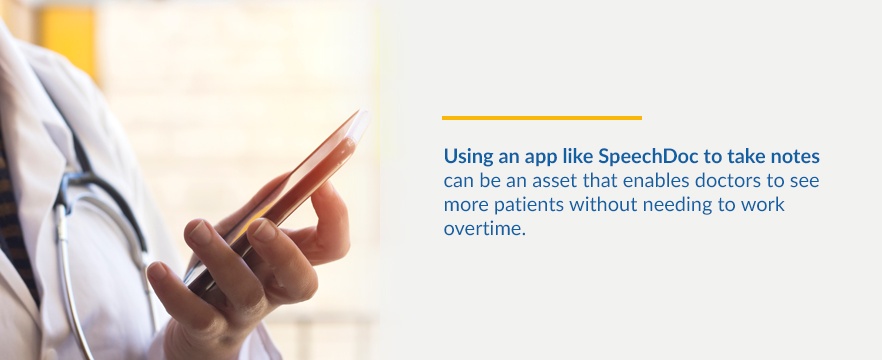
How Medical Transcription Can Ease Stress
Some technological advancements can ease stress rather than create it, and medical transcription is one of those positive advancements. It’s also one of the best stress management tips for health care workers. Workers who have trouble managing their stress can find relief by using medical transcription services to digitize their health records.
EHRs allow medical offices to become more organized, which allows for better patient care. Since doctors can dictate faster than they can write, using a recording app to take notes can be an asset that enables doctors to see more patients without needing to work overtime. Digital transcripts also help doctors take thorough and detailed notes on their patients, allowing for improved patient care without the burden of extra paperwork.
Aside from a more organized office that runs much smoother thanks to EHRs, digital transcription also requires minimal cognitive function, allowing health care professionals to avoid unnecessary stress. And medical transcriptionists often specialize in medical fields, which reduces the chances of errors that can lead to malpractice suits.
Plus, there is no additional equipment required: Doctors can record their notes directly into their smartphone or voice recorder and upload the files to the transcription service onto a cloud-based platform that is HIPAA-compliant, like TrackDoc.
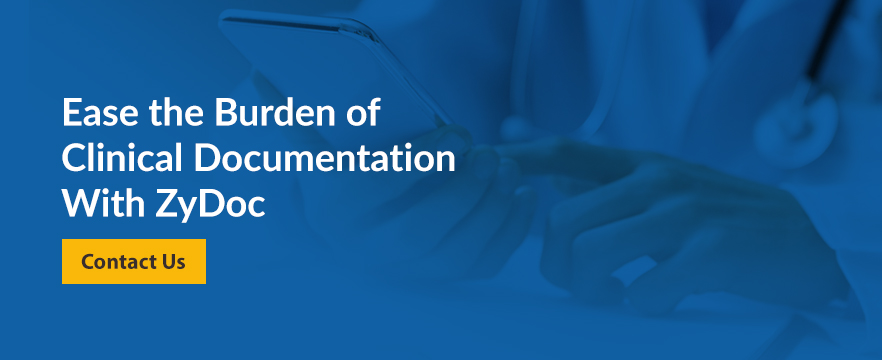
Ease the Burden of Creating Clinical Documentation With ZyDoc
There’s no reason to continue in a stressful environment when you can easily make life easier for yourself and those around you. ZyDoc uses cutting-edge technology to ease the burden of medical documentation and alleviate workplace tension. All our services are 100% HIPAA-compliant and designed by our CEO, who is also a medical doctor and knows the stress that can come with keeping accurate records.
With competitive prices and transcriptionists well-versed in medical jargon, ZyDoc can help reduce health care workers’ stress. Contact us at 800-546-5633 to discuss pricing options or to start your free trial today.
